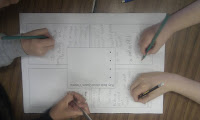Bill Boyd
Bill, a.k.a The Literacy Adviser, does just what it says on his tin (except he uses less cliches!) Having been a Principle Teacher of English, a Depute Head Teacher and an Education Manager with LTS he shares all of this knowledge in a way that captivates his audience. He has an obvious interest in modern culture and uses of film, comics and technology all blended together to present his argument that being literate means more than the understanding of books. In his talk he referred to a range of texts from comics to digital novels in the most authentic and unique sense. I'll attempt to summarise my notes from the morning in a series of paragraphs.
Language
Bill highlighted the evolution of language through our interaction with everyday texts. We learn to follow patterns in texts. He started off by having the audience consider ingredients, song lyrics, instructions and computer screens showing that we decode everyday texts using our prior knowledge and links to function. The fact that the range of texts that we use is wide and varied is highlighted by the wording of the Curriculum for Excellence's definition of texts.
"a text is the medium through which ideas, experiences, opinions and information can be communicated." CfE Literacy Across Learning: principles and practice.
Games-based Learning
Bill argues that the narrative in modern games are as valuable as texts as are film and written word. Games such as Myst are valuable when used as contexts for learning. Creative writing, fantasy worlds, problem solving and many cross-curricular themes can be found through games such as Samarost, Machinarium and the more recent Doctor Who games.
This made me think, surely the Doctor Who adventure games could provide a whole term's primary topic as children could delve into character development through the regeneration of the Doctor, exploring key points in history, familiar and fantasy geographic settings, technology as well as the idea of creative writing and parallel narratives.
The interactive novel
This resource really interested me. Bill took us through a novel titled Inanimate Alice. This was like no novel I had ever seen before. It was not simply a book converted to an ebook or simply an interactive decision-making story. Inanimate Alice puts you in the shoes of a young girl and fires stimuli at all of the senses for a completely immersive experience. As the chapters progress, the story of Alice and her trans-migratory family progress through different territories, exciting problems that Alice solves with the help of her handheld device-based friend. Children have created their own episodes which can be seen via the website though I have yet to explore this.
Graphic Novels
I've not been into comics since I stopped my subscription for 2000AD in the early 90's. I really think I've missed something! I remember visiting my cousin in Portsmouth as a child and being awestruck at his collection of thick graphic novels (He's now a successful graphic artist). These were not comics, these were novels with all the credibility of any piece of literature. Bill reignited my interest in graphic novels and made me realise that the gap between our literacy interests and that of the children is not as great as it sometimes seems.
Having thought about this, literacy is a perfect example of human's varying learning styles. Whilst studying English Literature at University, I would often sit through the film's of Shakespeare's plays. For me, this made the language far more accessible and the characters much more understandable. For Year 4 boys two years ago, Macbeth was brought to life by the graphic novels. The narrative remains the same but the means in which children digest, process and deconstruct these 'texts' is individual and as teachers we need to understand that. Bill says, look out for The Invention of Hugu Cabret and Chemical Reactions. I say look out for Macbeth: The Graphic Novel.
Film
I used to run the Filmclub for children where we would receive feature films to watch, discuss and write about. It worked but was difficult in the sense that a two-and-a-half hour film takes 3 weeks to watch and loses much of it's impact.
Bill directed us to a fantastic few websites that provide a great deal of teaching resources for short films that are more than manageable in class. Have a look at Moving Image Education, Scotland On Screen and Screening Shorts. I was very pleased to find the short animation The Sandman which I found so intriguing and terrifying that I have never deleted from a VHS tape that I recorded it onto, accidentally, about 15 years ago!
If you haven't been convinced of the value in analysing computer games, digital novels, film and animation as forms of text by now then Bill has provided further help in the form of the 7 Reading Strategies and the 10 Tools for Reading Film. These are certainly worth a read though I think it would be far better to share them with your pupils whilst deconstructing comics or film.
You can follow Bill's blog at http://literacyadviser.wordpress.com/ and you can must follow him on twitter @literacyadviser







